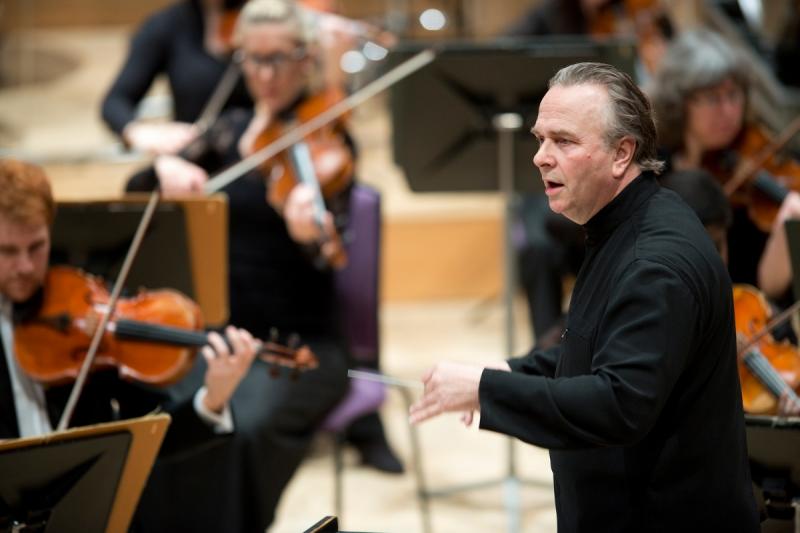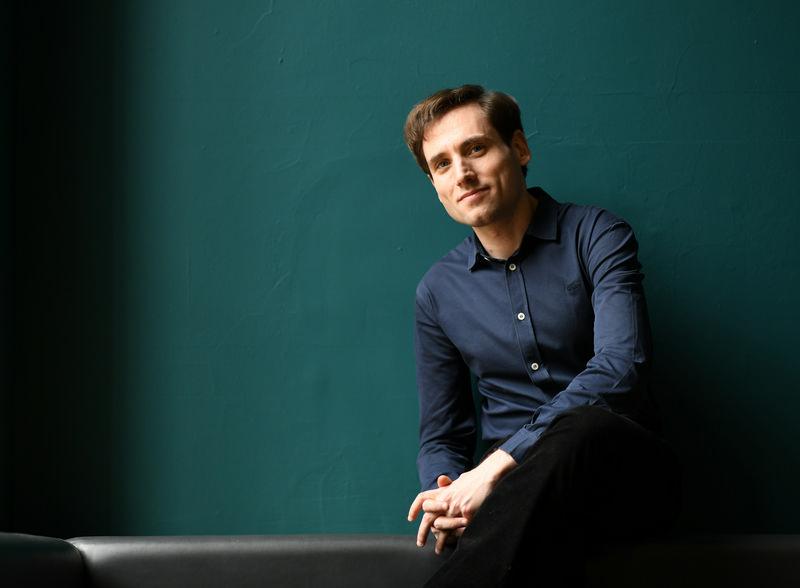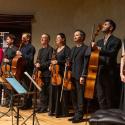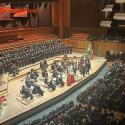Sir Mark Elder and the Hallé were making something of a statement in this concert. Gone was the extended platform, gone the distanced orchestral seating of the past 18 months or so (strings now back to shared music stands), and the programme (also a live broadcast on Radio 3) was both adventurous and, one hopes, attractive, with a star soloist and a barn-storming finale.
Boris Giltburg, the soloist in Rachmaninov’s Fourth Piano Concerto, was for elbow-bumping as he greeted the leader of the night, Jan Schmolck, but Elder seized him and others by the hand to share his enthusiasm. So was this, at last, the “back to normal” Hallé concert? Only time will tell.
It certainly was, to listen to. Elder (pictured below by Russell Hart) began with Josef Suk’s Fantastic Scherzo, a lively and beguiling piece, bringing to it a suitably big dynamic palette and clearly exposing its counter-melodies and orchestral detail. The first violins were elegant in high register in the time-changed trio section and precise in their pizzicati, and the divided cello choir were beautiful to hear in their moment of quiet glory.
Then the main event. Boris Giltburg has become a recognized master of Rachmaninov’s piano music and much in demand for it. The Fourth Concerto, though, is one that’s rarely heard. Why so? It has the nervy, insecure atmosphere of much music from the 1920s, and though all the old tricks are there it conspicuously lacks the long, uncurling melodies we think of as typically Rachmaninov. The slow movement lingers for some time on a brief theme which was identified from the start as having too much resemblance to the first phrase of “Three Blind Mice”.  There are constant moments of repose amid the pianistic fireworks, though, more characterized by nostalgia and melancholy than any heavenly yearning, and both soloist and conductor alighted on each one with charm and affection. Giltburg has the firepower to dazzle in all the technical acrobatics and at the same time a touch that glows in its cantabile and an approach that takes the music’s meditative side in full measure. The finale was extremely lively, and wind solos from the orchestra (Laurence Rogers’ horn in particular) matched Giltburg for purity and romance.
There are constant moments of repose amid the pianistic fireworks, though, more characterized by nostalgia and melancholy than any heavenly yearning, and both soloist and conductor alighted on each one with charm and affection. Giltburg has the firepower to dazzle in all the technical acrobatics and at the same time a touch that glows in its cantabile and an approach that takes the music’s meditative side in full measure. The finale was extremely lively, and wind solos from the orchestra (Laurence Rogers’ horn in particular) matched Giltburg for purity and romance.
After the interval it was off to Mickey Mouse land for Dukas’ The Sorcerer’s Apprentice (incidentally, in one of the interesting little connections woven through this programme, a piece Fantasia fans will have heard as conducted by Leopold Stokowski on the film soundtrack – the same Stokowski who premiered and recorded the Rachmaninov concerto with its composer).
This had all the vivid, storytelling quality we expect from this conductor and this orchestra, but it was just a warm-up for Janáček’s Sinfonietta, which has become almost a calling-card for Sir Mark and the Hallé. If they can muster a full-size orchestra and an extra 13 brass players to volley its fanfares over them into the vast space of the Bridgewater Hall, then everything must be back to normal, mustn’t it?
The piece, contemporary with the Rachmaninov concerto but a million miles from it in spirit, has buckets of rhythmic drive (which the concerto rather lacks), and Sir Mark loves its energy and sonic colours. The Hallé brass and wind were on their mettle, playing with heavenly sound in the slow movement and confidence and power in the scherzo-style one that follows. The conclusion, with returning fanfares, was completed in aptly stentorian manner.














Add comment